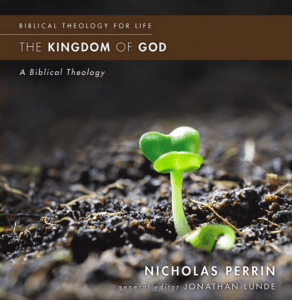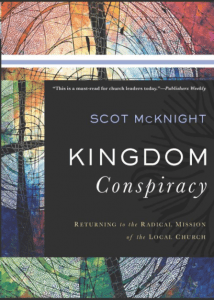 Anyone who wants to explain the kingdom of God as taught by Jesus/NT is faced with temptations. Here’s the first one: to want that kingdom to be almost entirely spiritual — something between a person and God, a religious experience, some religious power now at work, something not belonging to this world, something getting someone ready for heaven. A second temptation is to make it some political party, or some political cause, or something so earthy it is not religious at all. Ecology, liberation from oppression, justice for some murderer. Let’s call these the vertical and the horizontal. They are inadequate. The first group fears the political; the second group fears the religious.
Anyone who wants to explain the kingdom of God as taught by Jesus/NT is faced with temptations. Here’s the first one: to want that kingdom to be almost entirely spiritual — something between a person and God, a religious experience, some religious power now at work, something not belonging to this world, something getting someone ready for heaven. A second temptation is to make it some political party, or some political cause, or something so earthy it is not religious at all. Ecology, liberation from oppression, justice for some murderer. Let’s call these the vertical and the horizontal. They are inadequate. The first group fears the political; the second group fears the religious.
Neither of them is Jewish; neither of them biblical. Both are temptations to avoid.
Why do you think so many are against a political reading of Jesus? Is it possible to say “kingdom” and not be political?
In Tom Wright’s new book, How God Became King, the meaning of kingdom is discussed at length as the fourth speaker in the room (Israel’s Story, God’s Story, God’s People) — and Wright sketches it under the theme of the clash of (quite political) kingdoms.
The primary clash is between God and the satan, and that means where the satan is most at work — in Caesar, Rome, the powers — and where God is most at work — in Jesus and in Jesus’ people. The means of victory is through Jesus and the cross (and resurrection). This kingdom is both political and redemptive, it is both earthy and from God.
Anyone who wants a non-political kingdom message has avoided what the NT says; anyone who wants a non-political Jesus makes Jesus in their own image. The kingdom and Jesus are through and through political. A new kind of politics, to be sure, but still political. Now to some specifics from the chp.
1. The Bible’s story is often about God and the pagan powers and rulers and kingdoms: Babel, Egypt, Philistines, Assyria, Babylon, Greece and Rome.
2. The census of Augustus provides Luke with the opportunity to sketch a kingdom clash. Luke 1-2 (he doesn’t sketch how the birth scene of Luke 2 contrasts Jesus with Caesar: gospel, Son of God, peace, Savior are each political terms: Jesus is Lord, Caesar is not is at work in this passage).
3. Jesus’ power is not like Caesar’s: it is the way of the cross.
4. Wright sketches more fully how the clash of the kingdoms occurs in John, and it is a very suggestive sketch, worth your reading carefully. John 12, 14, 16 (through the church — he needs to emphasize this more often), 18, 19.
5. Render unto Caesar has nothing whatsoever to do with separation of church and state. The drive in Jesus’ day was political independence (read Benedictus in Luke 1, a text Tom does not mention in his Luke sketch). He sees “pay Caesar back in his own coin” to be a possible echo of 1 Macc 2:68 (pay the Gentiles back in full). Jesus is not colluding either with Caesar or the Zealots. His emphasis is on giving back to God what is God’s due.











